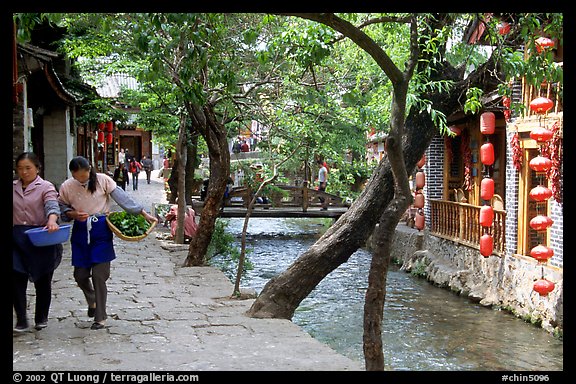Hmm, I really think I overdid the Emei Shan descent. I thought I was pressed for time (I needed to catch the last bus) and so I ran down 2000m of steps in 3 hours. My calves don't like me much now. But that doesn't matter, as I have found a hostel in Chengdu with a DVD player and a large selection of films, and so I have decided to spend an extra day here. Chengdu is the capital of Sichuan province, which is almost a country in its own right: it has a dizzying variety of landscapes (from mountains to forests to plains), many ethnic groups, and population-wise it would rank as the 12th biggest country in the world, just after Mexico. And out of all of China's different cuisines, Sichuan's is probably the most widely exported abroad. There is however one local speciality that I have not seen in any Western Chinese restaurants, and that is namely Chengdu's famous hotpot. The hotpot consists of a large pot of stock that bubbles away in the middle of the table whilst the diners place various ingredients (anything from chickens' legs to cabbage) into the cauldron (hubble bubble toil and trouble) before fishing them out a few minutes later. It's quite fun when your in a group, though we were unaware that the stock is always fish-based. Whoops, there goes my allergy.
But Sichuan isn't just about the food. It is also home to one of the most iconic animals on the planet: the giant panda. The range of the cuddly critter lies almost exclusively within Sichuan and the national panda research and breeding facility lies on the outskirts of Chengdu. That was an opportunity that I couldn't pass up, so off I went early in the morning to be able to catch them before they go to sleep for the best part of the day. The place was absolutely warming with tourists (me included, of course), though the locals were managing to be the most annoying by displaying 2 archetypal Chinese traits. The first is the inability to not shout, and the second is their complete disregard for signs. The fact that the signs in question asked for visitors to be quiet so as not to disturb and stress the animals made it even more galling for me. I therefore derived considerable pleasure from pointing out these signs and getting the people to shut up. The pandas themselves lived up to their reputation for cuteness by producing a great many saccharine poses for the cameras. Actually I say that but I was just happy to be there and see them.
But Sichuan isn't just about the food. It is also home to one of the most iconic animals on the planet: the giant panda. The range of the cuddly critter lies almost exclusively within Sichuan and the national panda research and breeding facility lies on the outskirts of Chengdu. That was an opportunity that I couldn't pass up, so off I went early in the morning to be able to catch them before they go to sleep for the best part of the day. The place was absolutely warming with tourists (me included, of course), though the locals were managing to be the most annoying by displaying 2 archetypal Chinese traits. The first is the inability to not shout, and the second is their complete disregard for signs. The fact that the signs in question asked for visitors to be quiet so as not to disturb and stress the animals made it even more galling for me. I therefore derived considerable pleasure from pointing out these signs and getting the people to shut up. The pandas themselves lived up to their reputation for cuteness by producing a great many saccharine poses for the cameras. Actually I say that but I was just happy to be there and see them.

